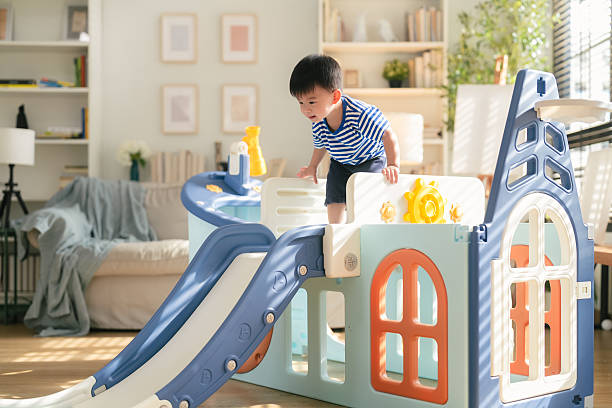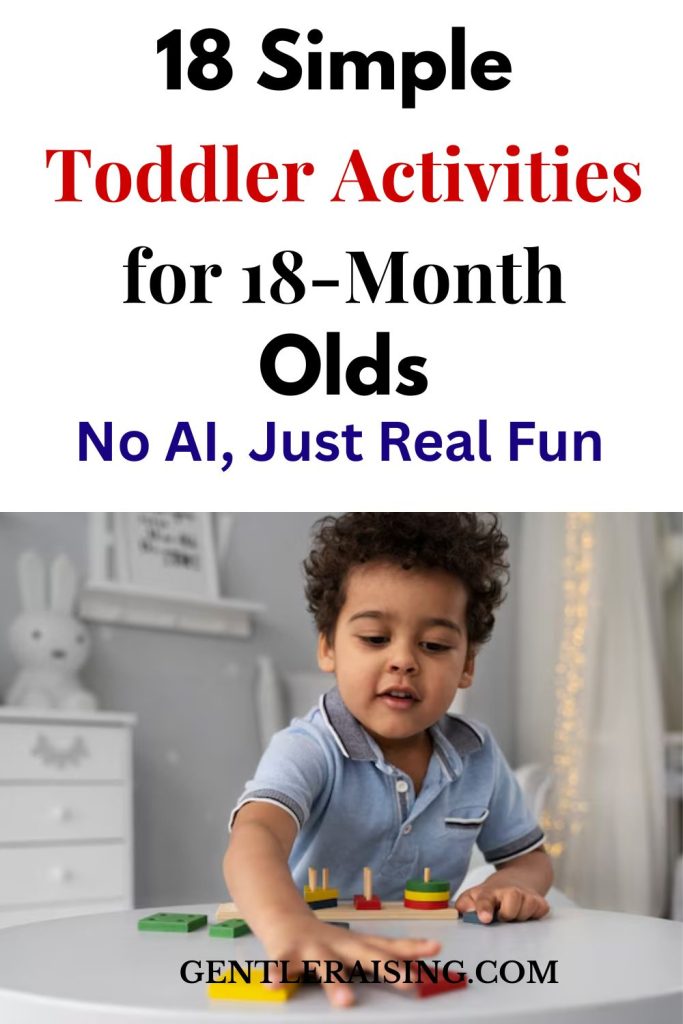So your baby just turned one, and suddenly, they’re everywhere. One moment they’re wobbling toward the kitchen, the next they’re under the table holding a spoon like it’s Excalibur.
Sound familiar? Welcome to the wonderfully chaotic, giggle-filled phase between 12 and 18 months when babies become little explorers with a deep curiosity for everything (and I mean everything).
At this stage, your toddler isn’t just learning to walk. They’re discovering gravity (a.k.a. dropping things for fun), testing limits, mimicking you, and soaking up the world like a sponge in a puddle.
The right activities now? They build more than just motor skills. They shape attention, empathy, creativity, and even emotional security.
Let’s unpack some real-life, parent-approved activities that feel less like a Pinterest board and more like your actual Tuesday morning.
1. The Mighty Stacking Game
You don’t need fancy toys. Provide your toddler with plastic cups, soft blocks, or even empty yoghurt containers. Watch them stack, knock down, giggle, repeat. Sounds simple? It is. But it’s also a full-blown brain workout.
- What it teaches: Hand-eye coordination, cause and effect, spatial reasoning
- Pro tip: Sit down and build with them. I promise, their squeals when they knock over your tower? Gold.
2. Kitchen Cabinet Explorers
Instead of baby-proofing every cabinet, designate one that’s safe and full of interesting (non-breakable) items, such as wooden spoons, measuring cups, and silicone lids. Let them open, empty, bang, and discover.
- What it teaches: Independence, sensory exploration, object permanence
- Warning: Yes, your kitchen will look like a toddler tornado hit. Deep breaths.
3. Music & Movement Mornings
Put on a playlist (Cocomelon counts, but throw in some Bob Marley too), and have a dance party. Shake maracas, clap hands, bounce. Don’t overthink it. Just move together.
- Why it matters: Builds rhythm, social bonding, gross motor skills
- Try this: Turn pots and pans into drums for a full-blown toddler jam session.
4. The Bubble Chase
One word: bubbles. Toddlers go bananas for them. Blow bubbles outside (or in your bathroom if it’s raining), and watch your little one chase them like a puppy.
- Why it’s genius: Encourages running, visual tracking, joy (seriously, JOY)
- Bonus tip: Use a bubble machine if your lungs need a break.
5. Water Play Without the Stress
Baths are great, but a shallow basin of warm water on the floor with floating toys? That’s playtime magic.
- You’ll need: A towel (or five), plastic cups, and patience
- It helps with: Fine motor skills, sensory awareness, attention span
- Note: Always supervise. Water play is fun, but safety first.
6. Books, Books, Books (Even if They Chew Them)
Yes, toddlers might treat books like teething toys, but this is where love for language begins. Pick sturdy board books with textures, flaps, and bold pictures.
- Why it’s big: Boosts vocabulary, attention, and memory
- Hot tip: Try reading with exaggerated voices. Make it fun, not a lesson.
7. Simple Art. That Isn’t About the Result
Crayons, non-toxic paint, and big paper. That’s it. Let them scribble, smear, and explore.
- What it teaches: Creative expression, colour recognition, hand strength
- Let go of: The need for a masterpiece. This is about the process, not the product.
8. Nature Walks With a Twist
You don’t need to scale a mountain. Walk around your block. Let them touch leaves, pick up (clean) rocks, and point at birds. Describe everything out loud.
- How it helps: Language building, curiosity, sensory development
- Mini idea: Bring a bag and collect nature “treasures” for a simple sensory box later.
9. Mirror, Mirror on the Wall…
Toddlers are fascinated by their reflections. Set up a baby-safe mirror during playtime and just observe.
- What it supports: Self-awareness, emotional recognition
- Tip: Play peekaboo or make faces together. It’s weirdly therapeutic.
10. Ball Pit Bonanza (Even DIY Ones)
Not everyone has space for a giant ball pit. But a laundry basket with a few plastic balls? Instant hit.
- What it does: Builds coordination, sensory play, and balance
- Add in: A few toys they can find or bury inside. Makes it even more fun.
11. Snack-Time Sorting
Yes, mealtime can be educational too. Give your toddler pieces of fruit or cereal in small bowls and let them sort, taste, and move pieces around.
- Skills gained: Fine motor control, colour identification, basic categorisation
- Pro-parenting tip: Count aloud while they munch. It’s sneakily educational.
12. Copycat Moments
One-year-olds are expert imitators. Use it to your advantage. Show them how to clap, stomp, blow kisses, brush hair, or pretend to talk on the phone.
- Why it rocks: Builds emotional bonding, imitation skills, and social cues
- Bonus: You’ll end up laughing a lot.
13. Blanket Forts & Quiet Nooks
Create a soft space where they can just chill. Toss a sheet over a table, add pillows, and throw in a couple of stuffed animals or books.
- Why it matters: Encourages independent play, calm time, and imagination
- Pro move: Bring snacks in there. Suddenly, you’re camping.
14. Everyday Chores as Play
Folding laundry? Give them socks to “match.” Sweeping? Hand them a baby broom. Toddlers LOVE being part of your world.
- It teaches: Life skills, responsibility, following instructions
- Secret bonus: Sometimes they help (sort of).
15. The Classic “What’s in the Bag?”
Fill a soft bag with random safe objects, a spoon, a toy car, and a rubber duck. Let your toddler reach in and guess what they pull out.
- Why it’s amazing: Develops tactile senses, vocabulary, surprise-and-delight
- Pro-parent move: Change the items every few days to keep it fresh.
A Few Ground Rules (Because Sanity Matters)
Let’s be real, you won’t do all these every day. And that’s okay. Toddlers are moody little creatures. Some days, they’ll play for an hour. Other days? They’ll throw a crayon at your face and refuse to nap. Roll with it.
- Keep it flexible: Your job is to create moments, not schedules.
- Follow their lead: If they’re obsessed with a wooden spoon, go with it.
- Repeat is good: Repetition helps toddlers learn. So yes, that tower might get knocked down a lot.
Final Thoughts: It’s the Little Things
Honestly, the best activity for your toddler might be you. Your smile. Your voice. The way you show up even when you’re exhausted. This stage is intense, but it’s also magic. Messy, sticky, loud magic.
So next time your little one is banging two bowls together like a tiny Gordon Ramsay, relax. They’re not just playing. They’re learning how the world works.
And you’re doing just fine.
Real parenting. Real growth. One block, bubble, and belly laugh at a time.

